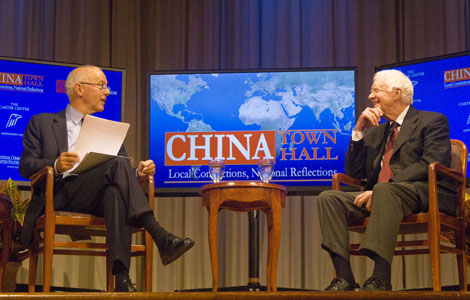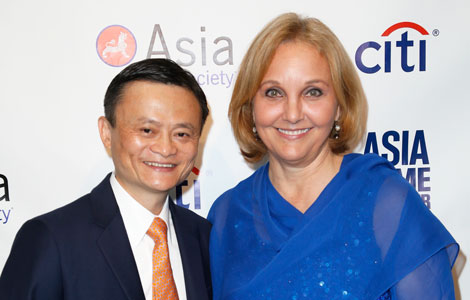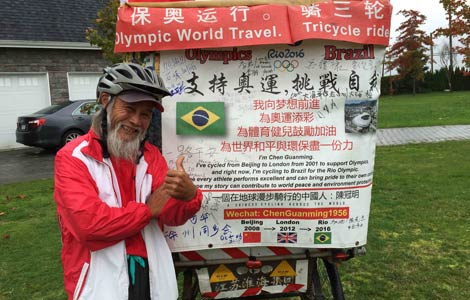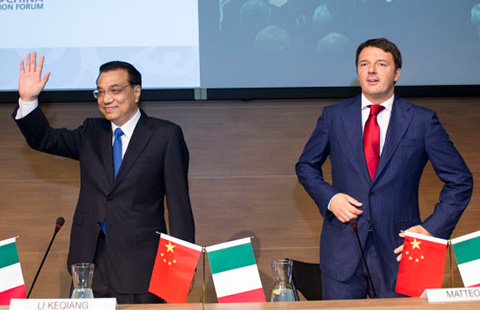China singled out for 'important' role in Africa's development
Updated: 2014-10-16 06:31
By AMY HE in New York(China Daily USA)
|
||||||||
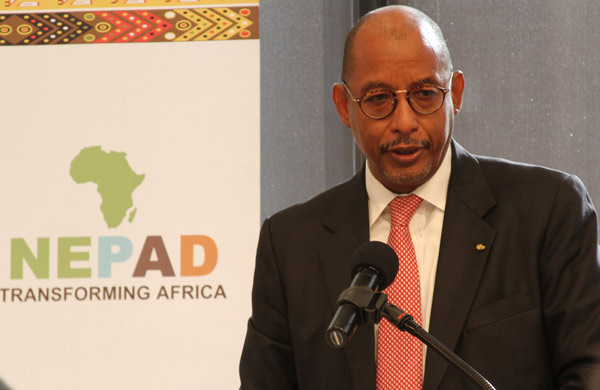 |
|
Ibrahim Mayaki, CEO of the New Partnership for Africa's Development (NEPAD), giving remarks at a media briefing, where he said that China's longstanding partnership with Africa plays an "important" role in the continent's development, New York, Oct 15. AMY HE / CHINA DAILY |
China plays a big role in African development and helping certain African countries with delocalizing its industries, said Ibrahim Mayaki, head of the New Partnership for Africa's Development, the African Union's economic development program.
"China is moving with countries like Ethiopia in delocalizing certain of its industries. I think that move will be expanded in the years to come. The partnership with China is long-standing partnership, but evolving according to the interests of both continents and both parties," Mayaki told China Daily at the sidelines of a media briefing held at the Ford Foundation in New York on Wednesday. Delocalization refers to the transfer of technology and production know-how from one country to another, mainly to bring about lower costs for the produced products.
"China plays an important role in infrastructure development," said Mayaki, who is chief executive officer of the New Partnership for Africa's Development (NEPAD). Established in 2001 by African leaders, NEPAD also has a program with China on training of nurses and midwives, who are all over central Africa, he added.
During the media briefing Mayaki discussed developmental problems that Africa faces as the continent heads into 2015, the deadline year for reaching the proposed Millennium Development Goals (MDG). Under the MDG, members of the United Nations in 2000 established f eight international development goals with a target to reach all of them by next year. The goals include halving extreme poverty, halting the spread of HIV/AIDs, and providing universal primary education.
"We realized that none of our national problems have an optimal national solution. The optimal solutions were at the regional level. Talking about Ebola, for example, the link is very clear: the Ebola challenge we're facing cannot be tackled on a national basis, it can only be tackled on a regional basis," he said.
China has provided aid to the Ebola crisis happening in West Africa, most recently sending thousands of doses of anti-Ebola medication to Africa, where it hopes to begin trials soon. The drug was developed by the Chinese military and enough has been sent to treat 10,000 people in Africa, according to the Financial Times.
China had previously sent a team of medical workers to West African countries like Sierra Leone, Guinea, and Liberia, and has provided financial and material support.
Mayaki also mentioned that African nations have not been good at implementing policy change, differing from countries in Asia.
"The further value of NEPAD was to think about implementation mechanism because Africa was no good at implementation, as compared to Asia. One of the great differences is that most of Asian countries have been very good at performing and implementation. We have not been very good at performing and implementation. Implementation means building the necessary institutions, the necessary capacities," he said.
In 2011, NEPAD signed a memorandum of understanding with China's Ministry of Agriculture to cooperate on accelerating agricultural growth and "eliminating underlying constraints in aspects of the African agricultural sector", according to the organization.
The partnership aimed to produce agricultural technology centers, vocational training to Africans, agricultural research, and exchange of policy experience as related to agricultural development.
amyhe@chinadailyusa.com
Most Viewed
Editor's Picks

|

|

|

|

|

|
Today's Top News
China-US summit will echo Sunnylands meeting
Obama may name Ebola 'czar'
Alibaba keeps analysts bullish month after IPO
Talks with HK protesters could start next week
More measures expected in China's healthcare reform
Alipay targets retailers with new services
Ambassador optimistic on China-Canada relations
The tenth Asia-Europe meeting opens in Milan
US Weekly

|

|
